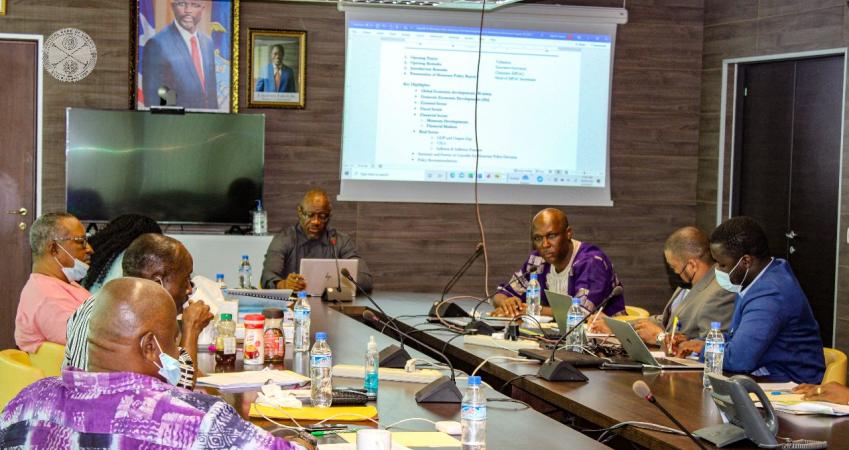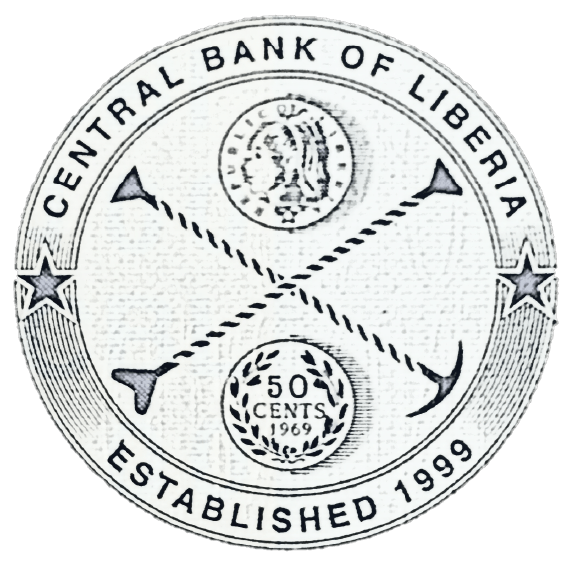
On July 20, 2023, the Board of Governors of the Central Bank of Liberia (CBL) convened its third Monetary Policy Committee (MPC) meeting of the year. The Board of CBL, representing the MPC, deliberated on developments in the Liberian economy and implications of global economic developments on the economy. The latest assessments of the Liberian economy informed the recent monetary policy decisions taken by the Board, which are intended to promote macroeconomic stability, including exchange rate stability.
Global Macroeconomic Developments
The Board acknowledged that the tightening of global financial conditions, higher inflation, the impact of the Russia-Ukraine war, and global developments continued to constrain global growth, leading to moderation in growth prospects to 2.8 percent for 2023, in compared to 3.4 percent recorded in 2022. The Board noted the likely economic impact of the fluctuation in the international prices of Liberia's main exports (i.e., iron ore and rubber) and was concerned about the rise in the price of rice during the quarter under review. However, the decline in the price of crude oil was welcoming as reflected in the domestic pump prices of diesel and gasoline.
The Board noted several of factors, including supply-demand imbalances that have contributed to the projected global headline inflation for 2023. Notwithstanding the decrease in energy price, global inflation is projected at 7.0 percent in 2023. Although global inflation is moderating, it is still higher than the historical average of 2.0 percent. Inflation is projected to decelerate to 8.6 percent in emerging market and developing economies, while it is projected to moderate to 4.7 percent in advanced economies. Sub-Saharan Africa is expected to record the highest inflation level of 14.0 percent, representing a 0.5 percentage point decline from 2022.
In response to the rising global inflation, interest rates were raised during the review quarter in several countries, including the United States, United Kingdom, Australia, and the European Union. Similarly, in the West African Monetary Zone (WAMZ), Ghana, Nigeria, The Gambia, Sierra Leone and Liberia, increased their policy rates in an effort to fight inflation. The monetary policy rate of the UEMOA nations, which comprise eight French-speaking West African countries and Guinea Bissau, was also raised, indicating the inflationary pressure in these countries.
Domestic Macroeconomic Developments
Based on latest assessment, the Liberian economy, which was projected to grow at 4.3 percent in 2023, was revised upward to 4.6 percent, mainly on account of projected increase in the mining & panning activity through gold production and the services subsectors. In light of these developments, the Board noted the prospects of achieving the revised growth rate for 2023.
Output in the secondary sector, which comprises the manufacturing subsector, is projected to grow by 5.1 percent based on anticipated growth in the domestic production of beverages and cement. Additionally, in the services sector, output is expected to expand by 5.9 percent in 2023, due to expansion in electricity & water, financial institutions, and government related services.
The Board was further concerned about the implications of the global uncertainty on the domestic economy, noting that the prevailing global and domestic developments have seen inflation rise to 11.3 percent in quarter two of 2023 from the 7.5 percent average rate recorded for the previous quarter, necessitating a stronger policy response to address the rise in consumer prices.
The Banking Sector
The Liberian banking sector remained well capitalized and liquid, with strong balance sheet indicators. Major indicators such as total loans and advances, gross total assets, total deposits and total capital increased by 3.5 percent, 6.0 percent, 6.8 percent, and 6.3 percent, respectively. However, credits to growth-enhancing sectors, especially manufacturing and agriculture remained low, an indication of the constraints faced by these sectors in accessing credits.
The Board noted the 0.4 percentage point marginal decline in non-performing loans (NPLs) to 15.8 percent, from the 16.2 percent reported in quarter one of 2023. However, it was concerned to the Board that the level of NPL ratio is above the regulatory minimum of 10 percent, thus stressing the need for tighter regulatory measures.
Monetary Aggregates and Financial Markets Developments
The Board acknowledged the 2.1 percent growth in broad money (M2) supply mainly due to growth of 9.0 percent in narrow money (M1), which grew on account of 7.4 percent growth in currency outside banks and 0.4 percent growth in currency in circulation during the review period, partially explaining the prevailing exchange rate and inflation pressures.
External Sector and Exchange Rate Developments
The Board noted the moderation in the trade deficit of 3.4 percent of GDP compared to 3.9 percent of GDP in quarter one of 2023, driven by a 9.5 percent growth in export receipts, despite the 1.3 percent rise in import payments.
Net remittance inflows to the economy was slightly down by 3.1 percent due to lower inflows through the commercial banks, which decreased by 10.7 percent to US$95.5 million, from US$107.0 million in the first quarter of 2023. However, inbound remittances inflows terminating to mobile wallets grew by estimated 8.5 percent to US$111.6 million, from the US$102.9 million in the first quarter of 2023. This shows the important role of mobile money in the economy, particularly remittance inflows.
The gross international reserves (GIR) were 3.2 months of import cover, reflecting a relatively strong external position of the country in responding to external shocks to the economy.
The Board was concerned about the rising depreciation of the Liberian dollar against the United States dollar on both the end-period and period-average basis. It further noted the persistent trade imbalances arising from strong imports, speculation attributed to uncertainty and other structural constraints as the main sources of the pressure on the exchange rate with potential implication for an increase in the inflation rate.
Near-Term Outlook
The Board noted the near-term outlook of the economy, which called for a proactive monetary policy stance. Based on the Bank’s forecast, in the third quarter of 2023, growth is projected to further strengthen, even though inflationary and exchange rate risks persist.
The current account is anticipated to remain in deficit due to strong import growth and replenishment of goods during post-independence holiday. This development is likely to put additional pressure on the Liberian dollar exchange rate in the third quarter of 2023.
Conclusion
At the close of its deliberation, the Board expressed optimism about the growth outlook of the Liberian economy, while being concerned about the headwinds associated with the prevailing exchange rate depreciation and potential inflation pressure based on the near-term outlook. The Board also expressed concern on the current level of NPLs, which has significant implication for financial stability and credit to the private sector.
Monetary Policy Decisions
Based on the current state of the economy and near-term outlook, the Board took the following decisions:
- Raised the Monetary Policy Rate (MPR) by 250 basis points to 20.0 percent from 17.5 percent to contain the potential build-up of inflationary pressures in the economy; and
- Removed the ceiling on the CBL bills to strengthen monetary policy operations consistent with evolving excess liquidity in the banking sector.
Finally, the Bank wants to assure the public that it remains committed to its mandate of maintaining price stability, which is a low and stable inflationary environment, promoting financial stability and supporting economic growth. The Bank will continue to monitor domestic and international economic developments, and in concert with other policy makers, take the appropriate actions to promote macroeconomic stability.
Signed: _______________________________________
J. Aloysius Tarlue, Jr.
Executive Governor & Chairman of the MPC
